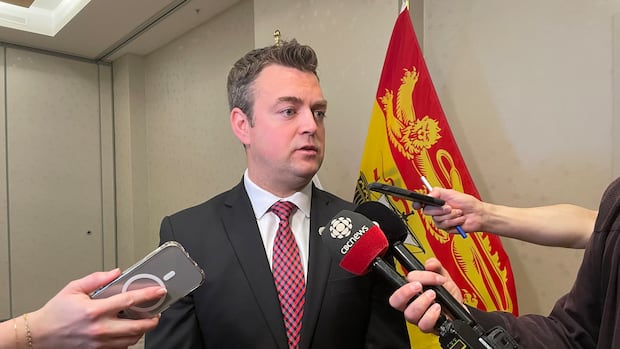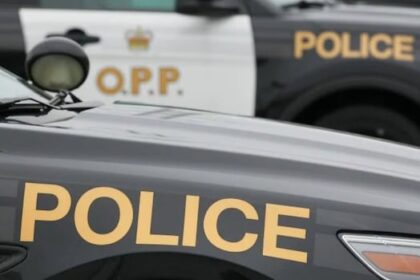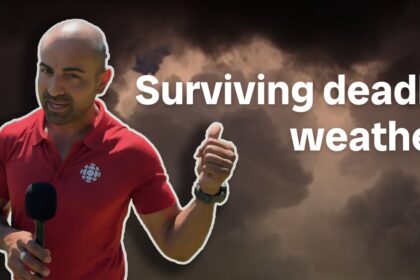New BrunswickThe New Brunswick government is taking a pass on one of the biggest legal cases on Charter rights in Canada in years. The province quietly withdrew in August from a Supreme Court of Canada case that will examine how the Constitution’s notwithstanding clause can — or can’t — override guarantees of fundamental rights. Attorney general says N.B. had no ‘distinct contribution’ on how governments use notwithstanding clauseJacques Poitras · CBC News · Posted: Oct 27, 2025 5:00 AM EDT | Last Updated: 2 hours agoListen to this articleEstimated 5 minutesAttorney-General Rob McKee says he has concluded that New Brunswick has nothing to offer the case that will examine how the Constitution’s notwithstanding clause can – or can’t – override guarantees of fundamental rights. (Victoria Walton/CBC)The New Brunswick government is taking a pass on one of the biggest legal cases on Charter rights in Canada in years. The province quietly withdrew in August from a Supreme Court of Canada case that will examine how the Constitution’s notwithstanding clause can — or can’t — override guarantees of fundamental rights.The Liberals criticized the previous Progressive Conservative government on two different occasions when it used, or considered using, the clause.But now that the party is in government, Attorney-General Rob McKee says he has concluded that New Brunswick has nothing to offer the case. “I felt we did not have a particular distinct legal contribution to make on that particular item and that we decided it wasn’t necessary to continue our participation,” he told CBC News.In 2019, McKee criticized Dominic Cardy, the education minister in the Blaine Higgs government, for invoking the clause to shield a bill on mandatory vaccination requirements from a constitutional challenge.In 2019, McKee criticized then-Progressive Conservative education minister Dominic Cardy, pictured, for invoking the notwithstanding clause to shield his bill on mandatory vaccination requirements from a constitutional challenge. (CBC)”It’s a slippery slope we’re going down here when we’re talking about Charter rights for citizens,” McKee said in November 2019. “It’s a dangerous precedent we’re setting.”The clause lets governments override Charter protections for freedom of religion, freedom of expression, freedom of association, as well as the right to bail, the right to be presumed innocent when charged with a crime and the protection against unlawful search and seizure.WATCH | ‘It’s a shame’: Province pulls out of Charter case:New Brunswick will skip major Charter rights case at Supreme CourtAttorney general says province has no ‘legal contribution’ to make on notwithstanding clause — despite his own past criticism.It can also override equality rights protections that prohibit discrimination on the basis of race, national or ethnic origin, colour, religion, sex, age or mental or physical disability.Any use of the clause to suspend those rights expires after five years but can be renewed.Higgs acknowledged in 2019 that the government had a legal opinion that Cardy’s bill — to eliminate religious and philosophical exemptions from vaccination rules for school children — would be struck down in court.Another Liberal MLA who is now a cabinet minister, Chuck Chiasson, also criticized Cardy’s move at the time.“Once a freedom is gone, it’s gone for good, and if we’re going to take away rights and freedoms … we better have tried every other alternative and we better have a darn good reason.”Liberal MLA Chuck Chiasson, who is now a cabinet minister, also criticized Cardy’s move at the time. (Sam Farley/CBC)The legislature voted unanimously to remove the notwithstanding clause from Cardy’s bill, which itself went down to defeat in a free vote two days later.In 2023, the Liberals again came out against using the clause when Higgs refused to rule out using it to block legal challenges to his changes to Policy 713, on pronouns and gender identity in schools.“Can the minister please reassure New Brunswickers that he will not use the notwithstanding clause?” party leader Susan Holt, who is now premier, said at the time. The clause “is becoming more and more part of the political conversation, including in New Brunswick,” said Kerri Froc, a law professor at the University of New Brunswick who has analyzed the reach of the notwithstanding clause.The clause, Section 33 of the 1982 Charter of Rights and Freedoms, allows a federal or provincial government to declare that a given piece of legislation will operate notwithstanding some other sections that protect rights.The case heading to the Supreme Court is about a Quebec law that prohibits certain public workers in positions of authority, such as judges, police officers, prison guards and teachers, from wearing religious symbols while performing their duties.Quebec used the notwithstanding clause to block legal challenges to the law. A challenge to that, and to Saskatchewan’s use of the clause to shield its pronoun and gender identity policies from a Charter challenge, are both headed to the Supreme Court and may be merged into a single hearing.The Saskatchewan Court of Appeal ruled that even if the the clause prevents a law from being overturned, courts can still declare which rights are being violated.Ottawa, some provincial governments and some interveners are arguing that the Supreme Court can put limits on how the clause can used.McKee said his office is “continuously evaluating, case by case” whether New Brunswick has anything particular to offer to cases before the Supreme Court.All provinces automatically get intervener status on Charter cases if they ask for it.Kerri Froc, a law professor at the University of New Brunswick, said it’s disappointing that the province isn’t intervening because the Holt government has prided itself on being very woman-friendly. (Zoom)“It’s a shame in a way but it’s maybe something that they looked at the political calculus and decided it was not in their interest to intervene,” Froc said “But it’s a bit unusual, I have to say.”Froc is giving legal advice to one of the organizations intervening in the Quebec case, the National Association of Women and the Law.She believes another section of the Charter that can’t be overridden by the notwithstanding clause — on equal rights for men and women — offers a way to limit the suspension of rights.“Personally, for me, it’s a little bit of a disappointment [that New Brunswick is not intervening] because we have a Holt government that has prided itself on being very woman-friendly,” Froc said.McKee said his hope is that the Holt government “would never be put in a position where we would have to use the notwithstanding clause.””We prefer protecting people’s rights and not suspending their rights.”ABOUT THE AUTHORJacques Poitras has been CBC’s provincial affairs reporter in New Brunswick since 2000. He grew up in Moncton and covered Parliament in Ottawa for the New Brunswick Telegraph-Journal. He has reported on every New Brunswick election since 1995 and won awards from the Radio Television Digital News Association, the National Newspaper Awards and Amnesty International. He is also the author of five non-fiction books about New Brunswick politics and history.
N.B. wont be part of Supreme Court case on suspending Charter rights











